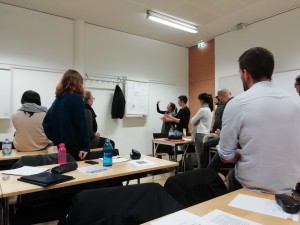Students’ Perspectives on a RM Workshop in Innsbruck

Responsible management: A course beyond the usual business studies
Sabrina Maly, Student MA International Business and Management (MCI)
Jade Pham, Student BA Business Administration (Excelia Group La Rochelle)
Johannes Rädler, Student BA Business & Management (MCI)
Benedikt Kramer, Student MA International Business and Management (MCI)
A necessary condition for reaching sustainability, responsibility, and ethics (SRE) in a business context and personally, is to create a distinct set of managerial competencies. The four-hour seminar Practicing sustainability, responsibility & ethics at the Management Center Innsbruck, was aimed to help students develop a basic set of such competencies across the domains of Knowing, Thinking, Acting, Interacting, Being and Becoming. The seminar was delivered by Oliver Laasch from the Center for Responsible Management Education upon invitation by the Management Center Innsbruck (MCI), a leading signatory to the UN Principles for Responsible Management Education in the DACH region.
WHY SHOULD A BUSY STUDENT OR MANAGER SPEND TIME ON THIS TOPIC?
As a student, you are aiming to make decisions, whatever kind of career you are currently planning and as a manager, you are already making decisions on a daily basis. But deciding carefully takes more than just an easy thought of maximizing profits and the value of stocks. It is in your hands to take action now and change the future step by step – If you know how.
THE SEMINAR’S CONTENT
The seminar was 3 hours and 15 minutes long, which might seem everlasting at first, but thanks to much interaction and many group tasks the time ran by very fast. The evening was divided into four sections of which everyone had a different purpose:
Session 1: Introduction and theory
The first part of the seminar started with presenting ourselves, the reasons for attending at the course and discussing our current knowledge and opinion on Responsible Management. We deepened that knowledge with an introduction to the theories of Responsible Management and got experts to a certain extent.
Session 2: Rich picture drawing
The second part was group work. Three different groups had to draw a big picture, thinking of a given subject. This type of task is called the rich picture method. We had to reflect topics such as “companies that recruit the only student from top universities”, or “leaving the fridge doors open in supermarkets”. Once the drawings were done, each group read through the drawings of another group’s work and try to interpret it. During this whole process, we tried to change the perspective on Responsible Management as often as possible to get a full understanding of a certain issue. Therefore, it was interesting to see how our ideas evolved around specific topics.
Session 3: The outside investigation
The purpose of the third part was to engage people outside the university in a conversation about aspects of sustainability and ethics. In order to do so, we went outside and asked people or business owners about a specific ethical subject. Most of us focused on the restaurant owners; together we discussed the waste of food and how they manage it. Finally, we compared the answers we got back in class. We all found that it is difficult to start a conversation about such topics with business owner’s since they do not want to admit a possible wrong behavior. Moreover, they may have felt being put under pressure and thus may did not answer completely honestly. Therefore, we developed alternatives on how to initiate a discussion about matters of ethics and sustainability.
Session 4: The self-reflection
For the fourth and last part of this seminar, we were given a couple of articles to read. In addition, we reflected our future self as Responsible Managers:
“I want to be a manager who…”
“My values are…”
“Therefore, I will and I will not…”
INDIVIDUAL STUDENTS’ THOUGTS
“The course with Oliver Laasch was part of my online badge Responsible Management. Since that topic is of high importance, every business student should know how to apply sustainable, responsible management in practice. The course was very interactive; therefore I was able to change my way of thinking and gain new perspectives on responsible management. Moreover, I got a clearer picture of who I want to be as a future manager.” Sabrina Maly
“Responsible Management means not only acting responsible in a business context, in fact, it means acting responsibly in everyday living. Therefore, your personal values have to support responsible management and you have to question your actions in detail.” Tanja Kulmer
“It was an interactive course with lots of information and communication between the lecturer and the students, encouraging them to think out of the box, get out of your comfort zone and act responsibly.” Fabian Rochelt
“Responsible Management was always a subject I was looking forward to discovering. The interactive class we had along with the different ways put in place to learn about the subject made the class fascinating. Discussing freely, the group works, outside interviews and interacting with other students of the course inspired me not only in how education should be like, but also in how important Responsible Management should be in business.” Jade Pham
“Managing responsibly, deciding ethically, and taking sustainable aspects under consideration, is not a matter of future business, but a field that our society is actually lagging behind already.Discussing several business cases made me wondering why we are not confronted with those courses in the original curriculum. For becoming the future managers, every graduate should discuss topics under those perspectives and have a certain standing for their future career.” Benedikt Kramer
